The upcoming film “Kalki 2898 AD” has been generating significant buzz in the Indian film industry, both for its ambitious vision and its star-studded cast, including Prabhas, Deepika Padukone, and Amitabh Bachchan. Directed by Nag Ashwin, the film promises to be a groundbreaking venture into the sci-fi genre, blending mythology with futuristic elements. However, the film recently found itself at the center of controversy when actor Arshad Warsi made a comment comparing his character in the film to the iconic comic book villain, the Joker. This comment sparked a wave of reactions online, leading the producer of “Kalki 2898 AD” to respond. Arshad Warsi, known for his versatility and comedic timing, recently shared his thoughts on his role in “Kalki 2898 AD” during a promotional event. In a casual remark, he mentioned that his character in the film had shades reminiscent of the Joker, one of the most iconic and complex villains in pop culture, famously portrayed by actors like Heath Ledger and Joaquin Phoenix. Warsi’s comment was intended to highlight the complexity and depth of his role, suggesting that his character would bring a similar sense of unpredictability and intensity to the film. However, the comparison to the Joker, a character deeply embedded in Western pop culture, did not sit well with some sections of the audience. Many fans of Indian cinema felt that comparing a character from a distinctly Indian sci-fi narrative to a Western comic book villain undermined the originality and cultural significance of the film. Social media was abuzz with debates, with some fans expressing their displeasure over what they perceived as an unnecessary and inappropriate comparison, while others defended Warsi, arguing that he was merely trying to convey the challenging nature of his role. In light of the controversy, the producer of “Kalki 2898 AD,” Vyjayanthi Movies, issued a statement addressing the comments made by Arshad Warsi. The producer clarified that while Warsi’s character in the film is indeed complex and multi-layered, the comparison to the Joker was purely metaphorical and not intended to draw direct parallels. The statement emphasized that “Kalki 2898 AD” is a uniquely Indian story, deeply rooted in Indian mythology and cultural ethos, and that any character comparisons to Western figures should be seen as an attempt to communicate the character’s depth rather than as a literal association. The producer also highlighted the film’s ambition to explore new territories in Indian cinema, particularly in the sci-fi genre, which remains relatively unexplored in Bollywood. “Kalki 2898 AD” aims to offer audiences something entirely new—a fusion of ancient Indian mythology with futuristic elements that reflects India’s rich cultural heritage while also pushing the boundaries of cinematic storytelling.
To understand the controversy better, it’s essential to explore the context of Arshad Warsi’s role in “Kalki 2898 AD.” Although details about the character are still under wraps, it is known that Warsi plays a pivotal role in the narrative, one that is integral to the film’s exploration of good and evil, chaos and order. In Indian mythology, the concept of a character who embodies both the chaotic and the divine is not new. Characters like Ravana from the Ramayana and Shakuni from the Mahabharata are examples of figures who, despite being antagonists, are portrayed with a complexity that makes them more than just villains. These characters are often depicted with shades of grey, embodying a mixture of virtues and vices, and are integral to the moral and ethical dilemmas that drive the narrative forward. Warsi’s reference to the Joker could be seen in this light—as an attempt to convey the complexity and unpredictability of his character, rather than a direct comparison to a Western comic book villain. The Joker is often celebrated for his chaotic nature, his philosophical musings on the nature of good and evil, and his ability to challenge the moral certainties of the heroes he opposes. Similarly, Warsi’s character in “Kalki 2898 AD” may serve as a foil to the protagonist, challenging the audience’s perceptions of right and wrong in a narrative that is likely to be rich in moral ambiguity. The controversy surrounding Arshad Warsi’s comment also brings to light the importance of cultural sensitivity in global cinema. As Indian cinema continues to make inroads into international markets, the lines between different cultural narratives are increasingly blurring. However, this also means that filmmakers and actors must navigate the complexities of cross-cultural comparisons with care. While the Joker is a universally recognized figure, deeply embedded in global pop culture, Indian mythology offers its own pantheon of complex characters whose stories resonate deeply within the Indian cultural context. By drawing parallels between these figures and Western characters, there is a risk of diluting the unique cultural identity that Indian films bring to the global stage. In this context, the producer’s response is significant. It reaffirms the film’s commitment to telling a story that is uniquely Indian, rooted in the country’s rich mythological and cultural heritage. By clarifying that Warsi’s comparison was metaphorical, the producer has sought to assure audiences that “Kalki 2898 AD” will remain true to its Indian roots, even as it explores universal themes that resonate across cultures. The controversy also highlights the role of social media in shaping public discourse around films. What might have been a passing comment in a pre-social media era has now become a topic of intense debate, thanks to the instant and widespread reach of platforms like Twitter and Instagram. Fans, critics, and even casual observers have weighed in on the issue, turning what might have been a minor remark into a significant talking point. Social media has undoubtedly democratized the conversation around films, allowing fans to voice their opinions and engage directly with filmmakers and actors. However, it has also increased the scrutiny on every word and action of public figures, often amplifying controversies that might otherwise have gone unnoticed.


